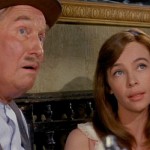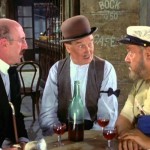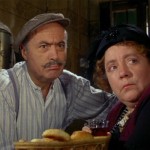
Fanny – 1961
Oh My Goodness! Two thirds of this movie was pure drivel! It was trying to be both a light-hearted comedy and a deep romance at the same time, and it failed at both. The comedy was horribly executed and the romance was both dreary and creepy, all at once. Let me explain.
First of all, if you have seen the 1958 Best picture Winner, Gigi, you have seen Fanny. Both movies took place in France, had a similar plot, two cast members who were in both films, and that same creepy pedophile vibe. What is it about the way these two films portray an old Maurice Chevalier as romantically lusting after teenage women? Seriously! The guy was in his 70s and he is drooling over Leslie Caron’s character, Fanny, who is supposed to be 17 years old, staring down the front of her dress at her breasts at very close range! It was a little disturbing.
Second, let’s take a look at the ridiculous comedy. OK, I get that it was a different time and that comedy is not what it is today, but this kind of stupid, juvenile humor seemed fit for a Vaudeville stage. For example, the film spent several minutes on a little game the old men on the waterfront of Marseille had a habit of playing. They would place a rock in the middle of the sidewalk and then cover it with a bowler hat. Then they would watch until a pedestrian would see the hat. Naturally, his inclination would be to kick the hat, right? Huh? And then, of course, the passers-by would kick the rock and hurt their feet. Haha!! What a riot! Never mind that everyone kicked the hat hard enough to send it and the rock tumbling down the sidewalk, but it never even budged. That’s comedy! Right? Right?!?
The humor just wasn’t funny. All the actors behaved as if they were on that same Vaudeville stage, complete with overdone double-takes, silly garbled voices when they are supposedly being choked, slapstick humor, and even a few village idiots. When characters are portrayed in such an over-acted way as to make me think they belong in strait jackets, something is wrong.
And then there was the crazy camera work. At least five or six times in the course of the 2 hour and 13 minute film, a silly technique was used in which a character had a surprise, and the camera would do a quick zoom to a close-up of the shocked face. It just looked like the trick of an amateur director.
Next, I have to mention the bad dubbing. It seemed pretty obvious that some of the voices were dubbed, and the worst offender was Fanny’s mother Honorine, played by Georgette Anys. Like all the other actors, she played her part so over-the-top that it was nearly clownish. Her mouth didn’t seem to move very much when she spoke and her voice didn’t seem to belong to her.
Playing opposite Leslie Caron as the male romantic lead was Horst Buchholz. I’m sorry to say that his acting was terrible. He was supposed to have a great longing to be a sailor and travel over the open sea, but whenever he talked about it, the camera would focus on a tight close-up. The overly-passionate expression on his face was unnerving. I couldn’t tell if he was about to cry or have an orgasm. Either way, I wanted him to stop. He seemed to be trying too hard to be deep and dramatic, and unfortunately he failed at both.
Now, all that being said, about a third of the film was passable. The story centered around Fanny and her star-crossed lover Marius, played by Buchholz. He gets her pregnant before going to sea and so she agrees to the marriage proposal of the wealthy Panisse, played by Chevalier. Marius’ father, Cesar, played by Charles Boyer, was the best part of the film. He still played it a little silly, but was not as bad as everyone else. Cesar agrees to be the godfather of the baby, knowing that it is his true grandchild. But when Marius returns unexpectedly and demands his fatherly rights, Cesar turns him away, saying that Panisse is the father that has loved the boy.
There were a few slightly dramatic moments that worked for me, like the scene when Marius leaves to become a sailor, or the scene in which Fanny finds out that she is pregnant. But for the most part, the ridiculous humor distracted me from the human drama that the filmmakers were trying to portray. I hold Best Picture nominations to a higher standard than this. Silly films have their place, but not as Best Picture nominations.









“…Never mind that everyone kicked the hat hard enough to send it and the rock tumbling down the sidewalk, but it never even budged. That’s comedy! Right? Right?!?…”
If memory serves me well, and I admit I cannot be sure, I think it wasn’t a rock, but instead, a fixed iron bollard of the kind that boats are tied up to and which would withstand a judiciously-directed high-velocity foot perfectly well with little or no movement whatsoever.
Apologies for my previous comment – I’ve checked and you are right, it was a block of stone that was so gleefully booted.